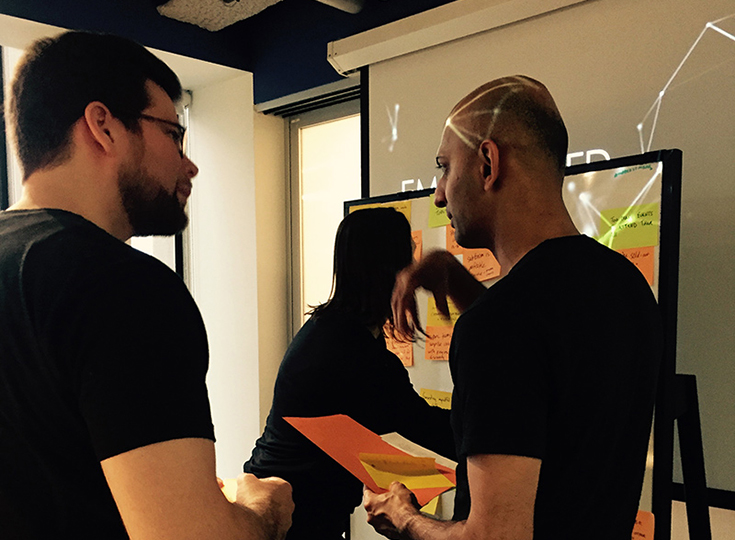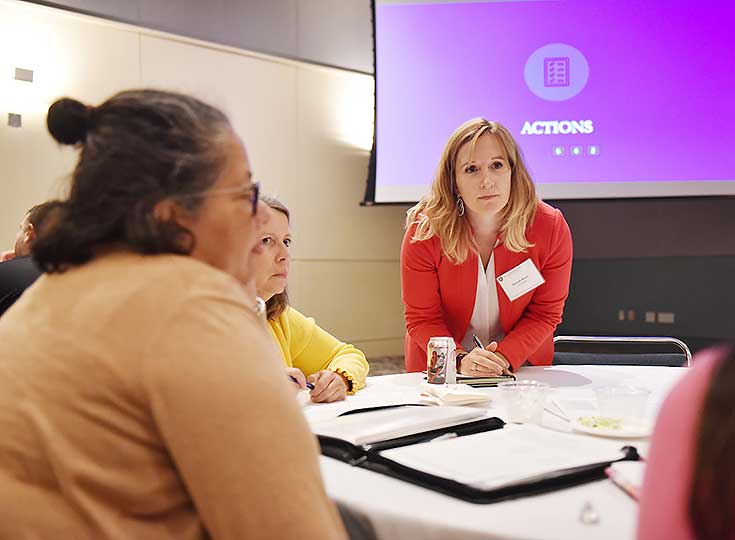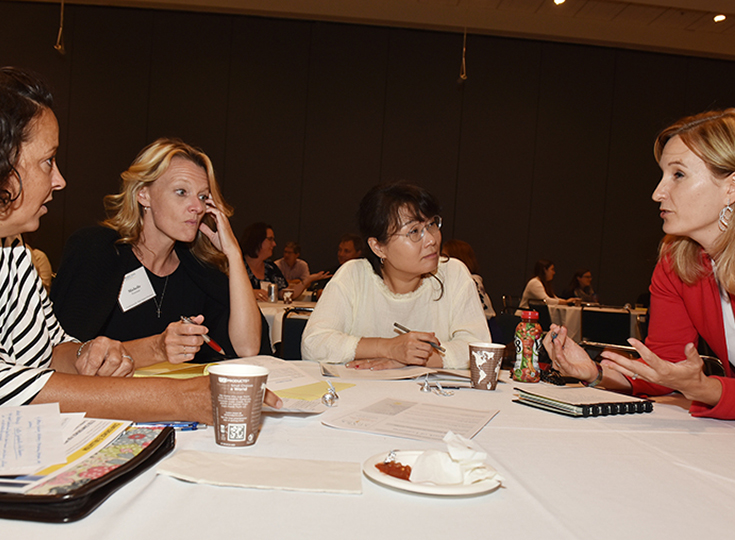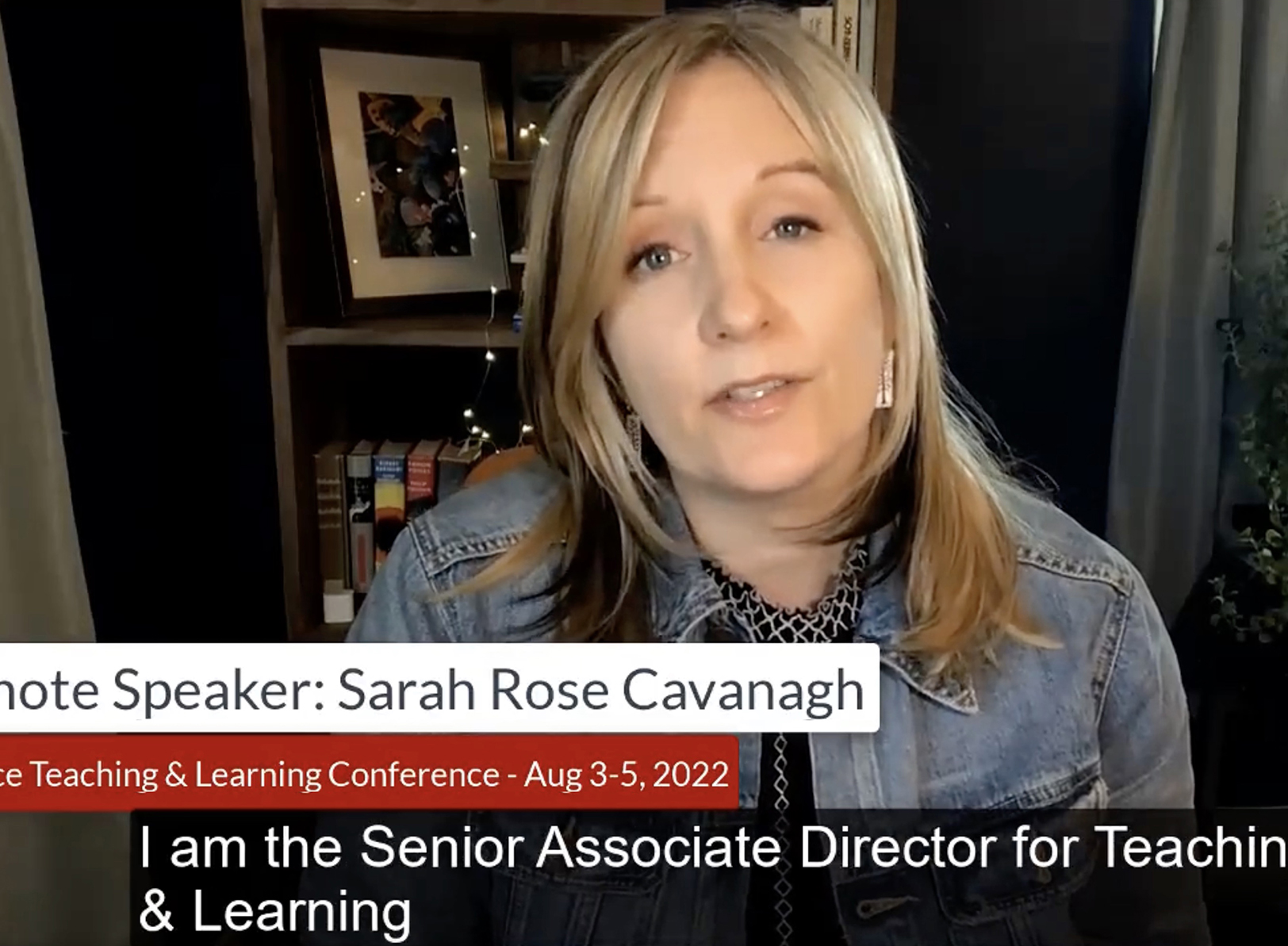Speaking
Sarah conducts keynotes, anchor sessions, plenary sessions, and interactive workshops for a variety of conferences and faculty in-services. Speaking engagements for education audiences have largely been solo, and engagements framed for business and corporate needs have been both solo and led with product innovator Julie Sargent. Industry clients have included the Bose Corporation, the WorkHuman conference, and design group Subforum.
Below are some popular topics that could be presented in either keynotes or interactive workshops for a variety of audiences, with sample slides for each presentation (usually the introduction to the talk).
For versions of these slides with links and alt text, see here.

“Sarah is the best kind of speaker–an expert who can translate research and ‘big ideas’ about teaching into concrete strategies and approaches. She knows and appreciates the realities of college classrooms.”
—Victoria Russell, University of Mary Washington
The Joy of Teaching
CULTIVATING STUDENT AND FACULTY WELL-BEING
A college class can be a peak human experience – a group of motivated, curious human beings working together on shared goals that enliven the mind and enrich the soul. It is also a rare example of human striving that has a clear beginning, a satisfying end, and the development of community in between. Indeed, a well-run college class represents all of the building blocks of subjective well-being: positive emotions, autonomy, competence, belonginess, and satisfaction with life. Unfortunately, this ideal is often not realized due to internal and external forces – distracting stressors weighing on instructors and students alike, poor institutional support, and a lack of inclusion. In this interactive keynote, Sarah Rose Cavanagh presents research from both the science of well-being and the study of learning to argue that teaching can (and should) be a joy, then shares practical ways that instructors and institutions can support faculty and student well-being.
You can read relevant essays here and here.
Who Would Benefit: Secondary or higher education audiences.
“Sarah gave one of the most well attended and engaging talks we have had for our campus since the pandemic. The level of faculty participation in the interactive activities also showed a high level of excitement from our faculty, which I think will inspire further action and pedagogical changes on campus.”
– Shelly JArenski, University of Michigan Dearborn
Nurturing Academic Well-Being
In a Liminal time
Higher education has entered a state of liminality — an uncertain and ambiguous transition time when it is clear more changes are afoot but the path before us has yet to become clear. In this state of ongoing uncertainty and constant change, how can we nourish ourselves and stay well? How can we lead? In this interactive session, psychologist and educational developer Sarah Rose Cavanagh will guide us through exercises designed to identify courses of action to support student, faculty, and staff well-being in an uncertain time. She will share data from psychology, neuroscience, and pedagogy to support her proposed actions, and highlight insights from a new book project on the science of well-being. Attendees will have the opportunity for both reflection and discussion and leave with an action plan for the summer and fall.
Who Would Benefit: Secondary or higher education audiences.
“Sarah Cavanagh’s warm and engaging presentation style draws the audience in as she seamlessly leads her workshop to help folks understand compassionate challenge through a mix of stories, science, and practical, action-oriented solutions. One of the best professional development workshops I have heard on this topic.”
—Paula Fitzpatrick, WPI
Supporting Faculty & Student Mental Health
Hope in a Time of Monsters
Teaching is a vocation. When supported with resources and security, it is a constantly renewing source of excitement and richness. The last several years of disruption, uncertainty, and overburdened workloads have exhausted teachers and students alike. Monsters have reared their heads, and we have understandably shrunk from them. Faculty are burnt out—sacrificing their own mental health, phoning it in out of desperation, or leaving the profession entirely. Students are experiencing an epidemic of mental health problems, especially of anxiety. As instructors, we can support and encourage student mental health through pedagogies of care. A pedagogy of care involves high-touch practices like frequent communication, flexibility, inclusive teaching practices, learning new technologies and techniques, and being enthusiastic and passionate. All these practices involve both a heavy investment of time and a high degree of emotional labor. How can we support our students without burning ourselves out? How can we revive our sparks? In this interactive keynote, Sarah Rose Cavanagh will present some research and food for thought based on her upcoming book on how higher education should respond to both faculty depletion and the student mental health crisis.
You can read relevant essays here and here.
Who Would Benefit: Secondary or higher education audiences.
“Best Speaker I Have Seen on Campus!”
—Jeremy Tiermini, Fingerlakes Community College
Balancing High Expectations & Compassion
Teaching Self-Determined Seekers
When you ask people to tell a story about their favorite teacher in their educational journey, they nearly always describe an instructor or coach who was warm, funny, empathetic…. but who also challenged them to rise to high expectations of effort and success. We know from motivation research that the best goals are those that are specific and difficult, as setting a low bar for oneself can be enervating rather than energizing. How can we create classrooms that encourage students to set challenging goals for themselves, that mobilize energy and stimulate creativity, while also being compassionate about the many difficulties our students face and nimbly flexible to adjust to their learning needs? In this interactive keynote, Sarah Rose Cavanagh will present some research and food for thought based on her most recent book on creating learning environments of compassionate challenge, ending on practical tips for teaching self-determined seekers of knowledge.
You can read relevant essays here and here.
Who Would Benefit: Secondary or higher education audiences.
“Sarah provided an interactive and scholarly backed virtual keynote that included practical applications. Her incorporation of a little risk and vulnerability helped our mostly in-person audience connect with her even though she was on-screen. She did a great job of customizing her work to our specific context.”
—Tom Pantazes, West Chester University
Energizing Learning with the Science of Emotion
Four Pillars of Emotional Engagement
Historically we have constructed our classrooms with the assumption that learning is a dry, staid affair best conducted in quiet tones and ruled by an unemotional consideration of the facts. The pedagogical world, however, is beginning to awaken to the potential power of emotions to fuel learning, informed by contributions from psychology and neuroscience. In this interactive presentation, Sarah Rose Cavanagh will argue that if you as an educator want to capture your students’ attention, enhance their motivation, harness their working memory, and bolster their long-term retention, you should consider the emotional impact of your teaching style and course design. To make this argument, she will bring to bear empirical evidence from the study of education, psychology, and neuroscience. She will also present results from a recently concluded research study evaluating whether providing students some tools from emotion regulation before a lesson benefits their short- and long-term learning. The presentation will conclude with practical examples of activities and assignments that capitalize on this research and can be implemented in your very next class.
You can read relevant essays here and here.
Who Would Benefit: Well-suited for secondary or higher education, could also be crafted for on-the-job learning.
“Sarah provided an excellent experience for faculty and staff on our campus! Her realistic and evidence-based approach was interesting, engaging, and full of specific ideas and strategies for improving how we work with students. Sarah’s ideas are refreshing and move us beyond the usual talking points on student mental health and anxiety. Exactly what we need now!”
—Cyndi Kernahan, University of Wisconsin
Enhance, Don’t Eclipse: Healthy Digital Media Habits
INSIGHTS FOR A DIVIDED WORLD
Hivemind: A collective consciousness in which we share consensus thoughts, emotions, and opinions; a phenomenon whereby a group of people function as if with a single mind. We have always been a remarkably social species — our moods, ideas, and even our perceptions of reality synchronize without our conscious awareness. The advent of social media and smartphones has amplified these tendencies in ways that spell both promise and peril. Our hiveish natures benefit us in countless ways: combatting the mental and physical costs of loneliness, connecting us with collaborators and supporters, and exposing us to entertainment and information beyond what we can find in our literal backyards. But of course, there are also looming risks, including echo chambers, political polarization, and conspiracy theories that have already begun to have deadly consequences. In this talk, psychologist and author Sarah Rose Cavanagh considers the implications of this magnification of our ultrasocial natures.
This talk could be crafted to focus more on political polarization, on collective versus individual identities, or on the relationships between technology and mental health.
You can read relevant essays here and here.
Who Would Benefit: Many different audiences, from schools to businesses to wellness groups, depending on the topic!



